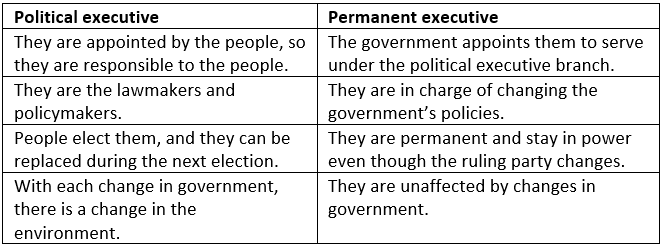Class 9 Civics Chapter 4 Extra Question Answers - Working of Institutions
Q1. State how the delays and complications introduced by the institutions are very useful in a democracy. [Important]
Ans: Working with institutions involves rules, regulations, and routines, which can lead to delays and complications. However, these delays can be beneficial for a democracy because:
- They allow for a wider range of people to be consulted on decisions.
- They prevent hasty decisions that may not be in the best interest of the public.
- They encourage thorough discussion and consideration of various viewpoints.
Ultimately, while dealing with institutions may be frustrating, it is essential for ensuring democratic processes.
Q2. Even though civil servants are far more educated and have expert knowledge on various subjects, why does the ultimate power to decide matters lie with the ministers? [Important]
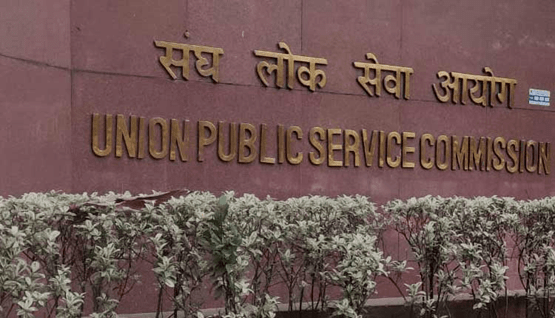
Ans: The ultimate decision-making power lies with ministers because they are elected representatives of the people. Here are the key reasons:
- A minister is accountable to the public for their decisions.
- Ministers set the overall framework and objectives for policies.
- While civil servants possess expert knowledge, they operate under the direction of ministers.
- Ministers consult experts but ultimately decide based on the broader goals.
This structure ensures that the will of the people is reflected in government decisions.
Q3. Who appoints the Prime Minister and the Council of Ministers, and on what basis?
Ans: The Prime Minister is appointed by the President of India, but this appointment is not arbitrary. The President selects:
- The leader of the majority party or coalition in the Lok Sabha.
- If no party has a majority, the President chooses someone likely to gain majority support.
Once appointed, the Prime Minister can continue in office as long as they lead the majority party or coalition. Following this, the President appoints other ministers based on the Prime Minister's advice. These ministers typically belong to the majority party or coalition in the Lok Sabha. The Prime Minister has the freedom to select ministers from among:
- Members of Parliament.
- Individuals who are not MPs, provided they are elected to Parliament within six months of their appointment.
Q4. In which way do the cabinet ministers exercise more powers than the other ministers?
Ans: Cabinet ministers hold more power than other ministers in several ways:
- Leadership Role: They are the top leaders of the ruling party and manage major ministries.
- Decision-Making: Key decisions are made in cabinet meetings, which other ministers must follow.
- Exclusive Meetings: Other ministers attend cabinet meetings only if invited.
- Coordination: Cabinet ministers coordinate the work of various departments and have the final say in disputes.
Q5. How has the rise of coalition politics imposed constraints on the power of the Prime Minister?
Ans: The Prime Minister in a coalition government faces several constraints on their power:
- They cannot make decisions unilaterally.
- They must consider the interests of various groups and factions within their own party.
- Collaboration with alliance partners is essential for governance.
- The survival of the government relies on the support of other parties.
These factors limit the Prime Minister's ability to act independently.
Q6. Why is an independent and powerful judiciary considered essential for democracies?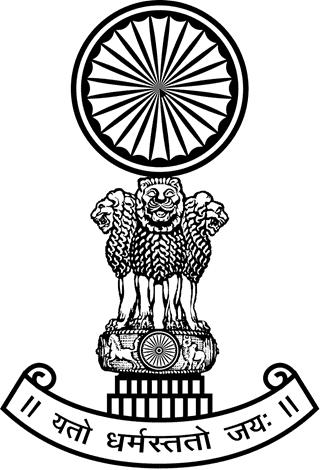 Logo of Supreme Court of India
Logo of Supreme Court of India
Ans: An independent and powerful judiciary is vital for democracies for several reasons:
- Separation of Powers: The judiciary operates independently from the legislature and executive, ensuring it is not influenced by political agendas.
- Protection of Rights: It acts as a guardian of Fundamental Rights, allowing citizens to seek justice if their rights are violated.
- Judicial Review: The judiciary can declare laws or executive actions invalid if they contradict the Constitution.
- Impeachment Process: Judges can only be removed through a rigorous process, making them less susceptible to political pressure.
These features ensure that the judiciary remains a check on government power, safeguarding democracy.
Q7. What is the procedure for the removal of the judges?
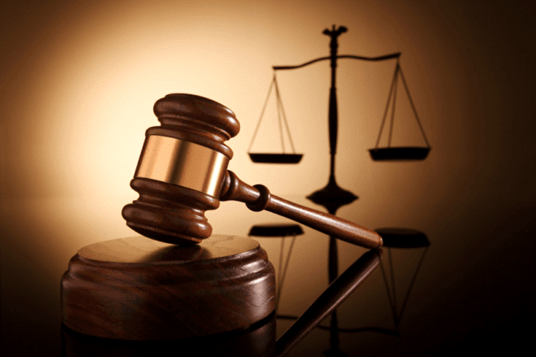
Ans: The procedure for removing a judge is known as impeachment. This process involves the following steps:
- A motion for impeachment must be passed by a two-thirds majority in both Houses of Parliament.
- Judges are appointed by the President but cannot be removed solely by the President.
- Both the Lok Sabha and Rajya Sabha must agree on the resolution for removal.
This process is significant as it ensures the independence of the judiciary, making it very difficult to remove a judge once appointed.
Q8. Discuss the powers and functions of the Parliament. [CBSE 2010]
Ans: Parliament is the ultimate authority for making laws in the country. Its key powers and functions include:
- Law-Making: Parliament can create new laws, amend existing ones, or abolish them.
- Government Oversight: It exercises control over the government, ensuring that those in power have its support to make decisions.
- Financial Control: Parliament manages public finances; government spending requires its approval.
- Debate Forum: It serves as the highest platform for discussing public issues and national policies.
Parliament is divided into two Houses: the Lok Sabha (House of the People) and the Rajya Sabha (Council of States). The Lok Sabha is directly elected and holds more power, especially in financial matters, while the Rajya Sabha represents various states and regions.
Q9. Explain the composition of the council of ministers. [2011 (T-2)]
Ans: After the Prime Minister is appointed, the President selects other ministers based on the Prime Minister's advice. These ministers typically belong to the party or coalition that holds the majority in the Lok Sabha.
- The Prime Minister can choose ministers from among the members of Parliament.
- Occasionally, a non-member can be appointed as a minister, but they must be elected to Parliament within six months.
The Council of Ministers is the official term for the group of all ministers, usually comprising 60 to 80 members of varying ranks.
- Cabinet Ministers are senior leaders responsible for major ministries. They convene to make decisions on behalf of the Council.
- Ministers of State with independent charge oversee smaller ministries and attend Cabinet meetings when invited.
- Ministers of State assist Cabinet Ministers and are attached to their ministries.
Since it is impractical for all ministers to meet regularly, decisions are made in Cabinet meetings. This structure is why many parliamentary democracies are referred to as a Cabinet form of government. Every ministry is supported by secretaries, who are civil servants providing essential information to help ministers make informed decisions. The Cabinet is also aided by the Cabinet Secretariat, which coordinates the work of various ministries.
Q10. Write about the process of appointment and removal of a judge of Supreme Court. [2011 (T-2)]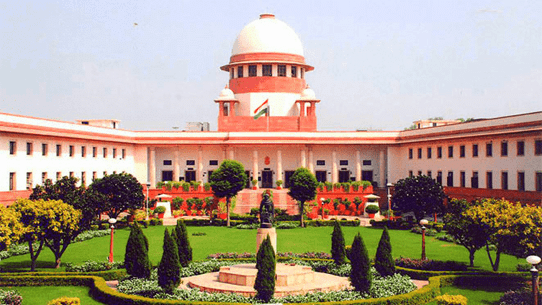 Supreme Court of India
Supreme Court of India
Ans: The process for appointing and removing judges of the Supreme Court in India involves several key steps:
- The President appoints judges based on the advice of the Prime Minister and in consultation with the Chief Justice of the Supreme Court.
- In practice, senior judges often select new judges for the Supreme Court.
- Removal of a judge can only occur through an impeachment motion, which requires a two-thirds majority in both Houses of Parliament.
This removal process is quite rare, reflecting the judiciary's independence and stability.
Q11. Under what condition can a state of emergency be declared in India? Explain. [2011 (T-2)]
Ans: A state of emergency can be declared in India under specific conditions:
- External aggression or armed rebellion increases.
- The government machinery of a state breaks down.
- There is a threat to the country's financial stability.
In these situations, the President can impose a state of emergency, which is referred to as President's rule.
Q12. Rajya Sabha is called the Upper House but that does not mean that it is more powerful than Lok Sabha. Our constitution does not give Rajya Sabha the same special powers over the states. But on most matters, the Lok Sabha exercises supreme power.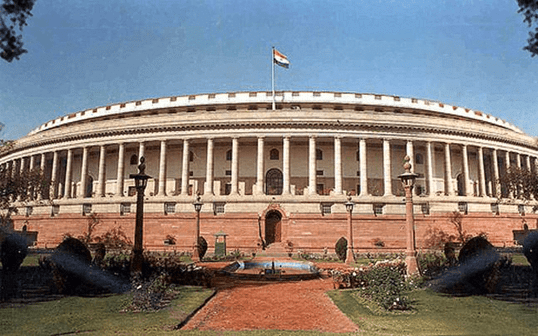 Parliament of India
Parliament of India
Ans: Rajya Sabha is referred to as the Upper House, but this does not imply it holds more power than the Lok Sabha. The Constitution grants the Rajya Sabha some special powers over states, yet the Lok Sabha generally holds greater authority on most issues. Here are some key points:
- Both Houses must pass any ordinary law. If there is a disagreement, a joint session is held, where the Lok Sabha's larger membership usually determines the outcome.
- The Lok Sabha has more control over financial matters. Once it passes the budget, the Rajya Sabha can only delay it for 14 days or suggest changes, which the Lok Sabha may accept or reject.
- The Lok Sabha oversees the Council of Ministers. The Prime Minister is appointed from among its majority members. If the Lok Sabha expresses 'no confidence' in the Council, all ministers, including the Prime Minister, must resign.
Q13. Why are political institutions important? Give any three points. [2011 (T-2)]
Ans: Political institutions are essential for the effective governance of a country. Here are three key reasons for their importance:
- Structure and Organisation: Institutions provide a framework for governance, ensuring that various activities are organised and managed efficiently.
- Decision-Making: Institutions like the Prime Minister and Cabinet are responsible for making crucial policy decisions that affect the nation.
- Conflict Resolution: The Supreme Court serves as an institution to resolve disputes between citizens and the government, ensuring justice is upheld.
Q14. Give three differences between the Lok Sabha and the Rajya Sabha. [2011 (T-2)]
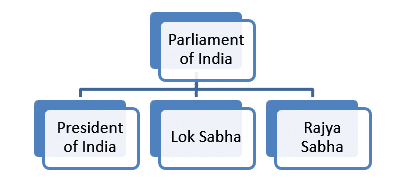
Ans:Differences between Lok Sabha and Rajya Sabha:
- Tenure: The Lok Sabha has a term of 5 years, while the Rajya Sabha is a permanent house with no fixed tenure.
- Election Process: Members of the Lok Sabha are elected through direct elections by the public. In contrast, Rajya Sabha members are elected by the representatives of state legislative assemblies, making it an indirect election.
- Strength: The Lok Sabha can have between 500 to 552 members, currently having 543 seats. The Rajya Sabha's strength ranges from 200 to 250, with 245 seats currently.
Q15. What is the tenure of the President in India? Mention the qualifications for President of India. [2011 (T-2)]
Ans: The President of India serves as the head of state with a tenure of five years. The qualifications required for a candidate to be elected as President are:
- Must be a citizen of India.
- Must be at least thirty-five years old.
- Must be qualified to become a member of the Lok Sabha.
- Must not hold any office of profit under the Union or any State government.
Q16. Under what circumstances does the President exercise his discretion in the appointment of the Prime Minister? Who appoints the other ministers? [2011 (T-2)]
Ans: When a party or coalition wins a clear majority in the elections, the President must appoint the leader of that majority party or coalition as the Prime Minister. However, if no party or coalition secures a majority in the Lok Sabha, the President can exercise discretion. In this case:
- The President appoints a leader who is likely to gain majority support in the Lok Sabha.
- The newly appointed Prime Minister may be asked to prove majority support within a specified time.
After the Prime Minister is appointed, the President appoints other ministers based on the Prime Minister's advice. These ministers typically come from the majority party or coalition in the Lok Sabha. The Prime Minister has the freedom to choose ministers, provided they are members of Parliament. In some cases, a non-member can also be appointed, but they must be elected to Parliament within six months.
Q17. What is a coalition government? Why the Prime Minister of a coalition government cannot take decisions as he likes? [2011 (T-2)] [Old NCERT]
Ans: The Prime Minister of a coalition government cannot make decisions unilaterally due to several key reasons:
- He must consider the interests of various groups and factions within his party.
- He has to collaborate with alliance partners and accommodate their views.
- The survival of the government relies on the support of these coalition partners and other parties.
While the Prime Minister leads the government, he operates within a framework that requires consensus and cooperation, limiting his ability to act independently.
Q18. What are the powers of the Prime Minister? Describe any three. [2011 (T-2)]
Ans: The Prime Minister holds significant powers as the head of the government, including:
- Chairing cabinet meetings, where key decisions are made.
- Coordinating the work of various departments to ensure smooth governance.
- Exercising general supervision over ministries, guiding their functions and operations.
Additionally, the Prime Minister has the authority to dismiss ministers, and when they resign, the entire ministry also steps down.
Q19. ‘Parliament is the supreme legislature of India.’ Justify the statement. [2011 (T-2)]
Ans: In all democracies, an assembly of elected representatives holds supreme political authority on behalf of the people. In India, this assembly is known as Parliament, while at the state level, it is referred to as the Legislature or Legislative Assembly. Parliament serves several crucial functions:
- Law-making authority: It is the final authority for creating laws. Parliaments can make new laws, amend existing ones, or abolish them.
- Control over government: Parliament exercises control over the government. Decisions can only be made if they have the support of Parliament.
- Financial oversight: Parliament controls public funds, ensuring that money can only be spent with its approval.
- Forum for discussion: It is the highest platform for discussing public issues and national policies.
In India, Parliament consists of two Houses:
- Lok Sabha: The House of the People, which holds more power, especially in financial matters.
- Rajya Sabha: The Council of States, which has some special powers but generally plays a supportive role.
All laws passed by Parliament require the assent of the President of India to come into effect. This structure ensures that Parliament remains the supreme legislative body in India.
Q20. Distinguish between political executives and permanent executives.
|
55 videos|635 docs|79 tests
|
FAQs on Class 9 Civics Chapter 4 Extra Question Answers - Working of Institutions
| 1. What is the role of the Prime Minister in the Indian political system? |  |
| 2. How does the Parliament of India function? |  |
| 3. What is the significance of the Constitution in Indian democracy? |  |
| 4. How are decisions made in a democratic government? |  |
| 5. What is the importance of local government in India? |  |

